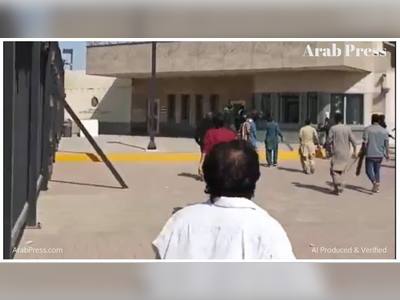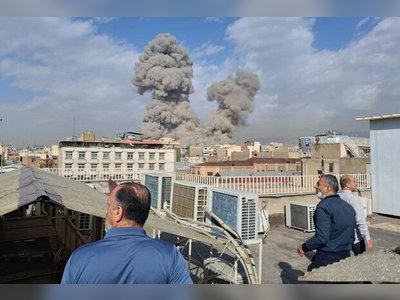
You Know What Would Help Exhausted Doctors and Nurses? More Money!
As health care workers prepare to enter the third year of the pandemic, we are experiencing disillusionment and burnout on an extraordinary scale. Many of us have confronted more death and sickness than ever before in our careers.
As a physician at a teaching hospital that was one of the hardest hit in New York, I have witnessed firsthand the mayhem that this pandemic has brought on. Some of my colleagues harbor frustration and even anger at patients who have chosen to remain unvaccinated or not wear masks and now are hospitalized with Covid-19, imposing additional risks to us and our families.
In this environment, attrition is inevitable. A survey of health care workers in the second half of 2020 found that 1 in 5 doctors and even more nurses were considering leaving their practice within two years. Today, hospitals are dealing with staffing shortages even as we work amid another viral surge.
Federal and state governments can and should do something to help. They should start by providing hazard pay to health care workers who continue to serve on the front lines of the pandemic.
Hazard pay is defined by the U.S. Labor Department as “additional pay for performing hazardous duty or work involving physical hardship.” Federal employees who work directly with “virulent biologicals” like the coronavirus may already qualify for such pay. A 25 percent hazard bonus is authorized for federal employees working directly with or close to substances “of micro-organic nature which when introduced into the body are likely to cause serious disease or fatality and for which protective devices do not afford complete protection.”
This definition certainly reflects the situation of health care workers in emergency rooms, intensive care units and medical wards today. The World Health Organization estimates that more than 100,000 health care workers may have died of Covid-19 between January 2020 and May 2021.
Though hazard pay won’t eliminate our professional risk, it will serve as a concrete and much-needed demonstration of appreciation to the doctors, nurses, respiratory technicians and other workers who continue to put their lives — and the health of their families — on the line for the public good.
In Congress, Democrats as well as Republicans have proposed legislation for federally funded hazard pay for health workers, but no bill has been passed into law. In May 2020, the House of Representatives passed a relief package called the Heroes Act that authorized $200 billion in hazard pay for essential workers — but it fizzled out in the Senate in the absence of sufficient Republican support. That same month, Senator Mitt Romney, Republican of Utah, proposed a “Patriot Pay” bonus for essential workers up to $12 an hour for three months. His proposal was also not approved.
Some states, such as Pennsylvania, have provided limited hazard pay using federal money from the $2.2 trillion pandemic relief bill that Congress passed in March 2020. Other states, including Massachusetts and Maine, have negotiated with unions to offer hazard pay to health workers in state facilities. Yet any bonuses offered have been modest, sporadic and temporary.
I am not under the illusion that hazard pay will cure the burnout and disaffection that is widespread in health care. Some of it undoubtedly predates the pandemic. However, hazard pay would recognize the outsize burdens that have been placed on health care providers working in once-in-a-century circumstances and acknowledge that society has an obligation to compensate us for our sacrifices.
Moreover, much of the essential work in hospitals is performed by low-wage workers — medical trainees, nursing assistants, custodians and orderlies — who often scarcely earn a living wage to support a family. The custodian who cleans the exam rooms in our clinic earns less than $20 an hour. Hazard pay for such workers could make a real financial difference.
How should such pay be provided? First, Congress must make federal funds available for this purpose. Then, states should determine eligibility criteria and wage thresholds. The most straightforward policy would be to include all health workers (medical and nonmedical) in facilities in Covid-19 hot spots.
To keep things simple and not penalize low-wage workers, the bonuses should be a fixed amount of money, rather than a percentage of pay, and should be authorized on a monthly or quarterly basis to discourage attrition. They should continue to be paid until there is a sustained reduction in hospitalizations. If funds are scarce, eligibility could be limited for those at the highest end of the pay scale — typically attending physicians like me.
Whatever the specific plan, for many health care workers the exact amount will not be as important as the gratitude and acknowledgment that it represents. Medicine is a humanitarian profession, and health care workers have a duty to care for the sick. But social order also relies on reciprocity and fairness.
Hazard pay would publicly acknowledge health care workers’ sacrifices and provide a tangible token of thanks beyond the clapping of hands or the public banging of pots and pans. This is about showing support, just as we do for our troops during war.
=============
* Dr. Jauhar is a cardiologist in New York who writes frequently about medical care and public health.
In this environment, attrition is inevitable. A survey of health care workers in the second half of 2020 found that 1 in 5 doctors and even more nurses were considering leaving their practice within two years. Today, hospitals are dealing with staffing shortages even as we work amid another viral surge.
Federal and state governments can and should do something to help. They should start by providing hazard pay to health care workers who continue to serve on the front lines of the pandemic.
Hazard pay is defined by the U.S. Labor Department as “additional pay for performing hazardous duty or work involving physical hardship.” Federal employees who work directly with “virulent biologicals” like the coronavirus may already qualify for such pay. A 25 percent hazard bonus is authorized for federal employees working directly with or close to substances “of micro-organic nature which when introduced into the body are likely to cause serious disease or fatality and for which protective devices do not afford complete protection.”
This definition certainly reflects the situation of health care workers in emergency rooms, intensive care units and medical wards today. The World Health Organization estimates that more than 100,000 health care workers may have died of Covid-19 between January 2020 and May 2021.
Though hazard pay won’t eliminate our professional risk, it will serve as a concrete and much-needed demonstration of appreciation to the doctors, nurses, respiratory technicians and other workers who continue to put their lives — and the health of their families — on the line for the public good.
In Congress, Democrats as well as Republicans have proposed legislation for federally funded hazard pay for health workers, but no bill has been passed into law. In May 2020, the House of Representatives passed a relief package called the Heroes Act that authorized $200 billion in hazard pay for essential workers — but it fizzled out in the Senate in the absence of sufficient Republican support. That same month, Senator Mitt Romney, Republican of Utah, proposed a “Patriot Pay” bonus for essential workers up to $12 an hour for three months. His proposal was also not approved.
Some states, such as Pennsylvania, have provided limited hazard pay using federal money from the $2.2 trillion pandemic relief bill that Congress passed in March 2020. Other states, including Massachusetts and Maine, have negotiated with unions to offer hazard pay to health workers in state facilities. Yet any bonuses offered have been modest, sporadic and temporary.
I am not under the illusion that hazard pay will cure the burnout and disaffection that is widespread in health care. Some of it undoubtedly predates the pandemic. However, hazard pay would recognize the outsize burdens that have been placed on health care providers working in once-in-a-century circumstances and acknowledge that society has an obligation to compensate us for our sacrifices.
Moreover, much of the essential work in hospitals is performed by low-wage workers — medical trainees, nursing assistants, custodians and orderlies — who often scarcely earn a living wage to support a family. The custodian who cleans the exam rooms in our clinic earns less than $20 an hour. Hazard pay for such workers could make a real financial difference.
How should such pay be provided? First, Congress must make federal funds available for this purpose. Then, states should determine eligibility criteria and wage thresholds. The most straightforward policy would be to include all health workers (medical and nonmedical) in facilities in Covid-19 hot spots.
To keep things simple and not penalize low-wage workers, the bonuses should be a fixed amount of money, rather than a percentage of pay, and should be authorized on a monthly or quarterly basis to discourage attrition. They should continue to be paid until there is a sustained reduction in hospitalizations. If funds are scarce, eligibility could be limited for those at the highest end of the pay scale — typically attending physicians like me.
Whatever the specific plan, for many health care workers the exact amount will not be as important as the gratitude and acknowledgment that it represents. Medicine is a humanitarian profession, and health care workers have a duty to care for the sick. But social order also relies on reciprocity and fairness.
Hazard pay would publicly acknowledge health care workers’ sacrifices and provide a tangible token of thanks beyond the clapping of hands or the public banging of pots and pans. This is about showing support, just as we do for our troops during war.
=============
* Dr. Jauhar is a cardiologist in New York who writes frequently about medical care and public health.
Comments

mike 4 year ago
Don't listen to what Bill Gates and the WHO say. Listen to the experience of the incorruptible experts.










